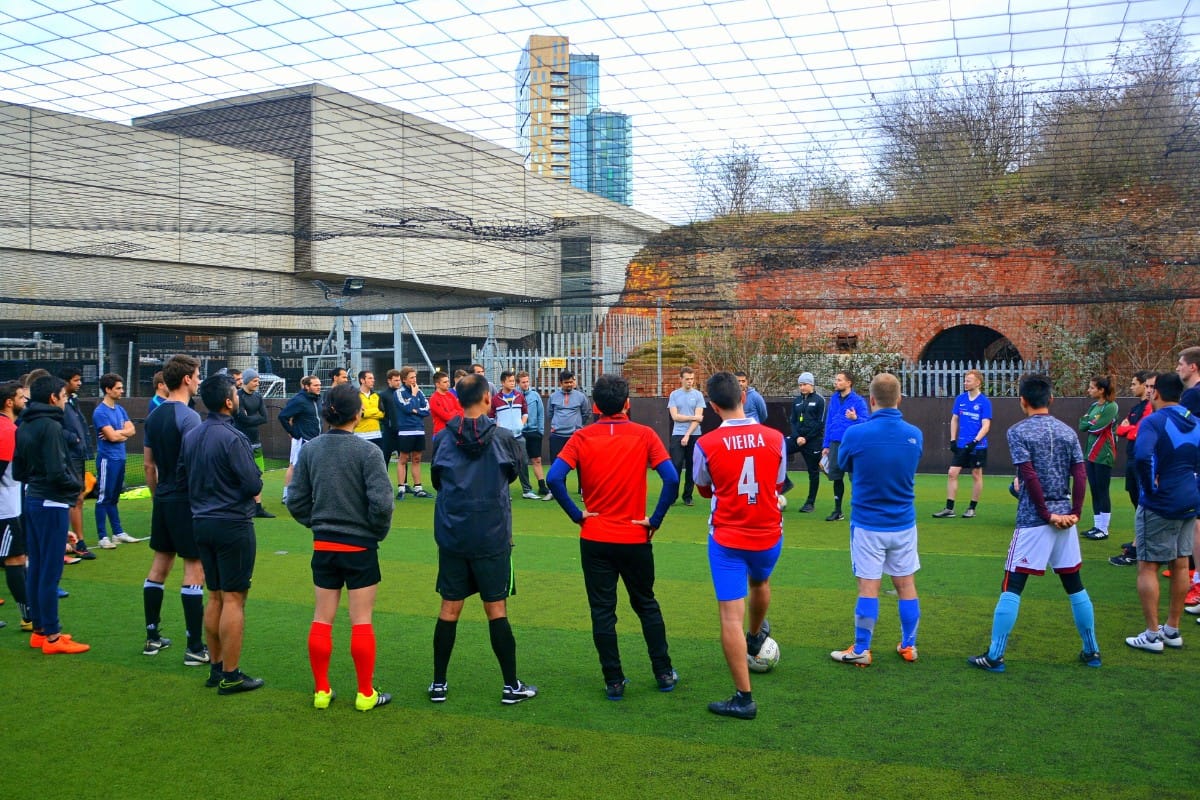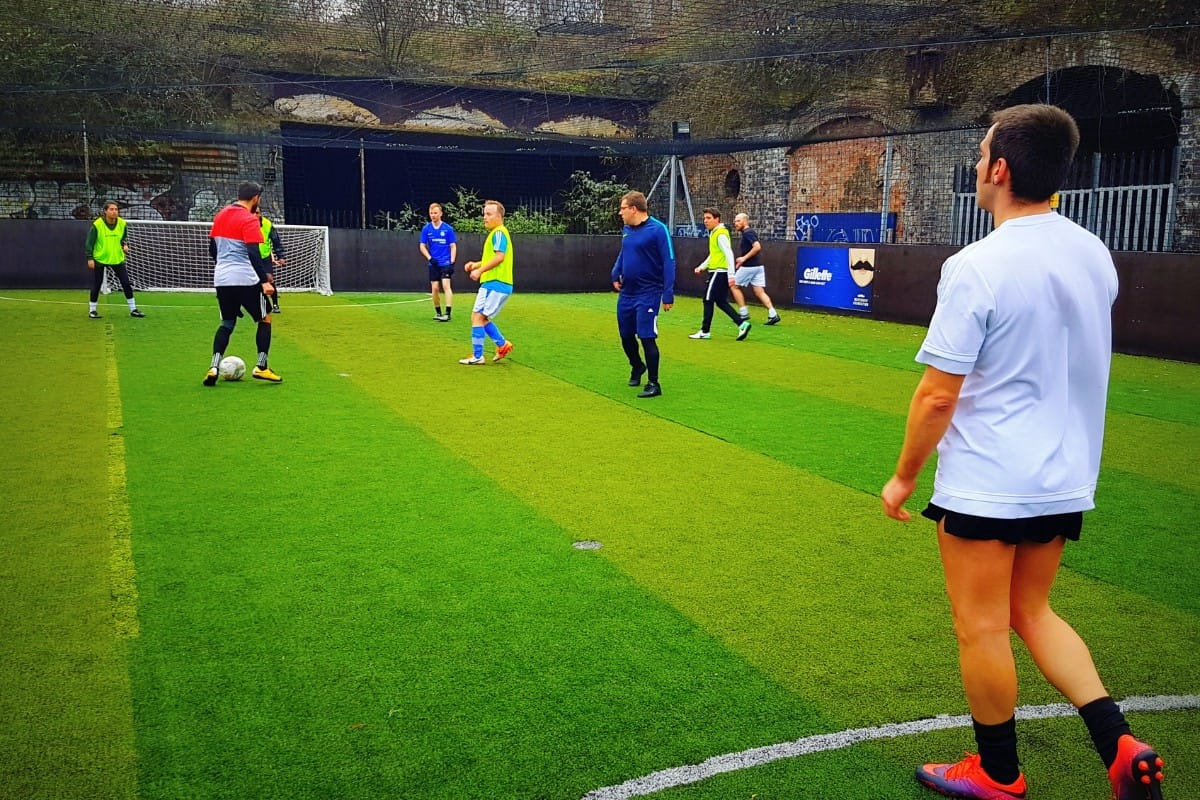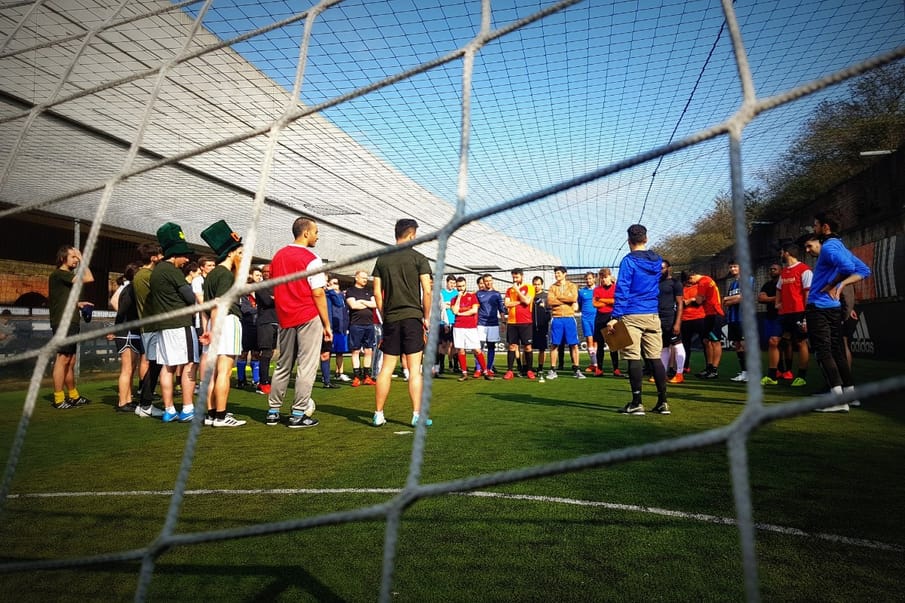Learning to play football as an adult might just be the game-changer you need to improve your mental health...
When Joe Kibble moved to a different part of London, midway through his doctorate training as a clinical psychologist, it was tough. Recognising signs of stress, he was looking online for some kind of activity that would help him cope when he stumbled on adult football training sessions aimed at beginners, and decided to give them a go. Fast-forward nearly six years and the sessions, organised by Experience Footy, are not only a highlight of his week, but a non-negotiable part of his self-care.
“I was training to be a clinical psychologist, which is notorious for being stressful and demanding,” the 34-year-old reflects. “I’d also split up with a partner a few months before and, having moved to north London, a lot of my friends were still in the south, so I felt a bit isolated. In the past, I had used running as a way of coping, but actually found it pretty boring. Football was something I enjoyed watching, talking about, and every now and again playing, but didn’t feel particularly confident with. When I was a kid I didn’t play, and only got into it when I was a teenager. By that point, all my friends were better than me and I felt a bit intimidated.”
Unlike other groups he’d seen, Experience Footy seemed to be more structured, teaching the basics to help gain confidence, and offering the chance to join in one-day tournaments where people wouldn’t feel intimidated by better players – which was exactly the aim founder Raphael Kopel had when he set it up in 2018 as the first-ever social enterprise providing football coaching sessions for beginner dults. Like Joe, he decided to start playing football as an adult, but realised it was virtually impossible – with most leagues set up for people with experience. So, he persisted until he learned, then took his own coach’s qualifications so he could help other adults start, and, in 2020, created a league of his own aimed at beginners.

His initiative, which organises weekly five-a-side football leagues, as well as tournaments and dedicated events for business people and children’s charities, hasn’t just provided adults across London with a place they can learn and practise a new hobby, but also provides much-needed support for many.
“I had my own mental health struggles during the pandemic, which may explain why I am so aware of the mental health of my members,” explains 45-year-old Raphael. “I got Covid in the summer of 2021, which resulted in a bout of insomnia and very low mood for a few weeks. It could have been a lot worse, but going to football every Sunday really helped me get through it.”
Since he set it up, Raphael’s group has flourished, and is full virtually every Sunday. It’s become a community where people meet outside football, doing everything from grabbing a drink to going backpacking together. All of this, plus the initiative’s WhatsApp group, has proved invaluable for many, says Raphael, with some members telling him it’s been vital to their mental health.
It’s certainly something Joe experienced. “My football ability gradually got better, but it also had a big impact on my wellbeing and mental health – it quickly became an important part of my week.”
The sense of community, of familiar faces to ‘check in’ with, was something that provided comfort, he says. Now a qualified clinical psychologist, he’s also confident of the well-documented positive effects exercise can have on mental health, citing 2024 research published in The BMJ supporting the idea that exercise can be as, if not more, effective as antidepressants for depression.
“The exercise they looked at in that study was more solitary, but I think there are added benefits to playing team sports. We know that for a lot of people struggling with depression, or general stress and anxiety, loneliness and isolation can be a part of that. Having that added layer of being around people, feeling even just a small sense of connection with another person, can have a big effect.”
The fact that football involves strategy and teamwork is also helpful, in Joe’s view. “You’re very mindful when you’re playing football. You’re in a bit of a flow state, because you’re having to think about so many other things – where your teammates are, what you’re going to do with the ball, where you need to be, who you need to mark. You’re in the moment, and less focused on other worries or stresses.”
Additionally, the communication involved can help people struggling with confidence or socialising, whether due to their mental state at the time, general awkwardness in social settings, or a hangover from the isolation of the pandemic.
“Playing football in a group can be a good way of allowing people who are not feeling confident socially to just be around people. You don’t have to engage in small talk, but maybe talk about the exercise you’re doing or the football at the weekend,” says Joe. “Then there’s another layer of communication when you’re playing – you’re having to communicate verbally and non-verbally and, as humans, we get something from that. Even if we’re not talking about ourselves or our lives, or having that ‘normal’ conversation, there’s a positive feeling that can come from cooperating with another person or team. And that might feel a lot more manageable for people who feel social conversation or interaction is difficult.”

The positive impact on mental health is something Raphael sees as hugely valuable. His group of aspiring footballers may change, due to being at different stages of their lives, or moving geographically, but its popularity remains proof of its importance.
“One of the things that is special is it’s for people of any age, colour, gender, any background,” Raphael says. “It’s such a mix – we’ve had people who are depressed, or people who are fine and just want to learn. It’s very eclectic.”
With several years’ experience as to how this kind of activity can help people, Raphael has some words of wisdom to those setting out on their journey. The first is to take things easy – and resist the urge to want to be as skilled as top-flight footballers. “People often compare themselves to the professional players they watch, then get disheartened.”
On top of that, the benefits of committing to something regularly are clear – and that means showing up even when you don’t want to, whether that’s because you’re tired, it’s raining, or any other number of reasons.
“When you’re in the same place at the same time, on a regular basis, this is when you notice certain things, and is the good thing about committing yourself,” he says. “It doesn’t have to be football – it could be yoga, it could be anything. But if you commit yourself then it becomes part of your routine and you feel the benefits, you build up a bit of resilience, and that can help.”
Images | Experience Footy


Comments